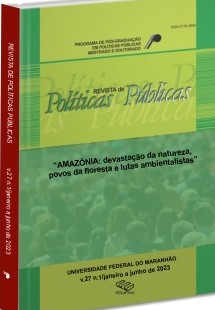THE APINAJÉ PEOPLE AND SOCIAL ISOLATION
changes in urban paths after the Covid-19 pandemic
DOI:
https://doi.org/10.18764/2178-2865.v27n1.2023.11Keywords:
Covid-19, indigenous people, urban pathsAbstract
Before the distancing and social isolation to the Covid-19, we investigated – in Tocantinópolis (TO) – the circulation of the Apinajé indigenous people through the local market and the presence of some as residents of a rural village, located in an intermediate position between the indigenous reserve area and the city. Due the challenges posed by the pandemic, the presence of indigenous people in the urban and rural areas of the city underwent profound changes, which grew in size in our investigation. Therefore, the problem explored in this article is the understanding of the effects of the coronavirus pandemic on the paths and interethnic relations of the Apinajé people in Tocantinópolis city, which already presented a process defined by tensions. Taking into consideration that the most vulnerable social groups suffered the consequences of the pandemic more drastically, the data we found in our research allowed us to record how this happened in the dynamics of an indigenous people in the northern region of Brazil. Our goals were to describe how this process configured in the relationship of the Apinajé with the people of the city and to identify resistance and other forms of confrontation of these people in order to guarantee their survival in the face of such an event, keeping their circulation in the city. This is an ethnographic research, using interviews.
Downloads
Downloads
Published
How to Cite
Issue
Section
License

This work is licensed under a Creative Commons Attribution-NonCommercial-NoDerivatives 4.0 International License.
UNIVERSIDADE FEDERAL DO MARANHÃO
PROGRAMA DE PÓS-GRADUAÇÃO EM POLÍTICAS PÚBLICAS
REVISTA DE POLÍTICAS PÚBLICAS
Termo de Transferência de Direitos Autorais
Como condição para a submissão, os autores devem declarar a autoria do trabalho e concordar com o Termo de Cessão de Direitos Autorais, marcando a caixa de seleção após a leitura das cláusulas)
- Declaro que participei da elaboração do trabalho referido, em parte ou no todo; que não omiti qualquer ligação ou acordo de financiamento entre os autores e instituições ou empresas que possam ter interesses na publicação desse trabalho;
- Declaro tratar-se de texto original, isento de compilação, em parte ou na íntegra, de minha autoria ou de outro (os) autor (es);
- Declaro que o texto não foi enviado a outra revista (impressa ou eletrônica) e não o será enquanto a possibilidade de sua publicação esteja sendo considerada pela RPP;
- Declaro que transfiro os direitos autorais do trabalho especificado para a RPP, comprometendo-me a não reproduzir o texto, total ou parcialmente, em qualquer meio de divulgação, impresso ou eletrônico, sem prévia autorização dessa Revista.
- Declaro que tenho conhecimento que a cessão do texto à RPP é gratuita e, portanto, não haverá qualquer tipo de remuneração pela sua utilização.

Este obra está licenciado com uma Licença Creative Commons Atribuição-NãoComercial-SemDerivações 4.0 Internacional.







